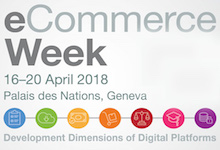Korea’s new e-government in today’s digital economy
17 Apr 2018 11:30h - 13:00h
Event report
[Read more session reports from the UNCTAD E-Commerce Week 2018]
Officials from the Republic of Korea convened to share their strategies for digitising tedious government processes as part of the 2018 United Nations Conference on Trade and Development (UNCTAD) E-commerce Week. Mr Kibyoung Kim (Director, Global E-government Division, Ministry of the Interior and Safety, Republic of Korea) began the session by discussing e-government’s potential. He defined e-government as any effort undertaken to automate analogue registration, taxation, and the like using technology.
Kim laid out the challenges to e-government, noting that return on investment (ROI) requirements and avoiding siloed technology stands in the way of e-government’s full proliferation. He continued by citing UNI-PASS, a fully automated customs clearance system that was launched in the country with great success. Furthermore, he noted KONEPS, a system that automatically contracts with the private sector for government procurement contracts. Both of these systems took approximately ten years to implement, and the key to their success according to Kim, was that both were launched in phases, giving the private sector time to adjust to the new modes of commerce.
He further noted that the Korean government began publishing raw data about school districts and residential neighbourhoods, data that the private sector incorporated into consumer apps. Zigbang, the Korean equivalent of Airbnb, launched thanks to this publicly available data, as did Iamschool, an app that relays information about primary and secondary schools. Kim concluded by acknowledging the success of Korean e-government so far, but noting that there is still much to do to achieve an ‘intelligent government’ informed by artificial intelligence (AI) and blockchain technology.
Mr Heehoon Kang (First Secretary, Embassy of the Republic of Korea in the United Kingdom) continued with a deep-dive into the workings of KONEPS, Korea’s automated procurement platform. Kang stressed that government contracts are one of the areas most susceptible to corruption in the Korean economy, with over $USD 400 billion lost to fraud on a yearly basis. KONEPS automates the process for submitting and bidding on government contracts, archiving all activity and communication along the way, he added. There is still work to be done on the platform, Kang asserted, as the need for supply chain management makes KONEPS an ideal candidate for blockchain technology.
Mr Keunhoo Lee (Director, Information Planning Division, Korea Customs Service) launched into the specifics of UNI-PASS, Korea’s automated customs processing platform. Among the product’s features, Lee accentuated UNI-PASS’s capacity to facilitate communication between trade and public agencies along with ensuring compliance with international standards. Nonetheless, the system needs to keep pace with the growing parcel volume, much of which is illegal goods, but the results are promising to date, Lee added. UNI-PASS has saved nearly $USD 3.5 billion in logistics costs and raised tax revenues commensurately, according to internal Korean reports.
The session concluded as delegates from the several countries questioned the Korean panel about the business models for their automated platforms.
By Frank Kosarek
Related topics
Related event

